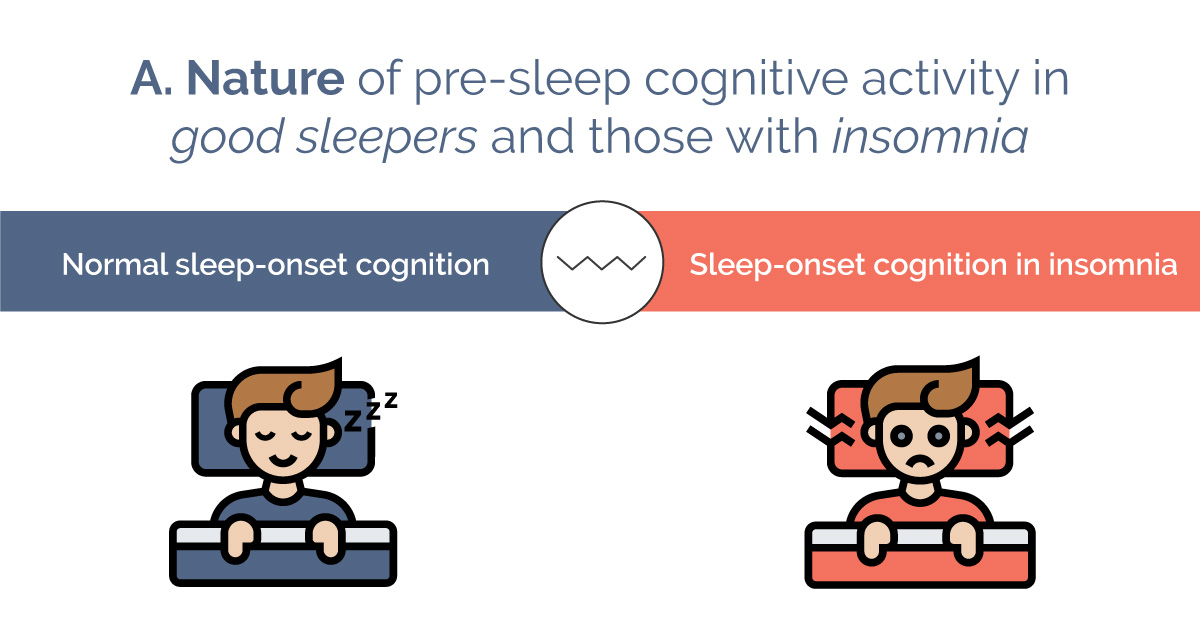I’ve compiled one of the most extensive collections of science-informed sleep tips you’ll find online. These aren’t just folk psychological recommendations, but grounded in research, and the list continues to evolve.
Continue reading Updated List of Recommendations for Better Sleep
Tag: sleep
Can Your Bedtime Thinking Keep You Awake? Or Help You Fall Asleep?

As an undergraduate student in psychology, on Sunday evenings I sometimes had trouble falling asleep.
In my third year, I was introduced to (and fell in love with) theoretical AI-driven cognitive science. I learned that Professor Claude Lamontagne had devised a computational theory of visual motion perception, from which he rigorously predicted an entirely new class of visual illusions. (By rigorously, I mean that his computer simulation of visual motion perception evinced these illusions: Sigma smooth pursuit eye movements). Lamontagne not only had a theory, he demonstrated the potential of theoretical AI for psychology. If you deeply understand a system, you may be able to predict new phenomena and also manipulate the system, and perhaps even trick it. (Sadly, rather than focusing on Lamontagne’s theory of visual motion perception, empirical psychologists latched onto Lamontagne’s Sigma effect merely as an experimental paradigm, which became a little empirical cottage industry. If you are interested in computational psychology, you must read Lamontagne’s thesis. It is a masterpiece.)
Lamontagne’s work led me to ask myself, “if I understood how the brain controls sleep onset, could I devise thought patterns that would help me fall asleep?” So, I would try to form a model of the system, informally derive hypotheses from it, test them on myself, use the data to try to improve my understanding, and iterate.
Fast forward many moons: my colleagues and I conducted the first systematic literature review on sleep onset mentation, which was published in Sleep Medicine Reviews last month: Lemyre, A., Belzile, F., Landry, M., Bastien, C., & Beaudoin, L. P. (2020). Pre-sleep cognitive activity in adults: A systematic review. Sleep Medicine Reviews, 50, 1-13.
To help the general public understand it, with Laura Lefurgey-Smith, we then designed an infographic about our paper. The header image of this post is cut from that infographic.
Continue reading Can Your Bedtime Thinking Keep You Awake? Or Help You Fall Asleep?
Our Paper in Sleep Medicine Reviews on Pre-sleep Cognitive Activity: A Systematic Review
Our systematic review of the literature on pre-sleep mental activity has been accepted for publication as a Clinical Review by the prestigious, high-impact journal, Sleep Medicine Reviews:
Limitations of Sleep Tracking Apps and Hardware: Anything New and/or Useful in this Information?
I answered some questions on the Mac Power Users forum about the usefulness of sleep tracking technology. Given that sleep is essential to cognitive productivity, I thought I’d let you know that I followed up today with a blog post on the mySleepButton web site: “Limitations of Sleep Tracking Apps and Hardware“.
Before reading that post, however, I would encourage readers to make a bullet list of their opinion on the subject. Then they can assess what, if anything, is new (potent) and useful in what I’ve written. (An application of the “CUP’A” criteria from Cognitive Productivity books.)
Francophone Sleep Lovers! Don’t Sleep in on Saturday: Tune into Radio-Canada Interview About Sleep
CBC Radio host, Mireille Langlois, will interview me and a clinical psychologist live on Radio-Canada (CBC Radio French) about the quality of sleep. We will focus particularly on seasonal (summer) challenges and issues.
The interview will be broadcast live throughout Western Canada on Saturday morning at 8:25 AM Pacific. But if you do sleep in, you can catch a podcast of the interview later or listen from Radio-Canada’s website.
SharpBrains Article by Luc P. Beaudoin on Sleep Onset
SharpBrains is an independent market research firm tracking health and performance applications of neuroscience. Their mission is complementary to CogZest’s. It is:
to provide independent, research-based, information and guidance to navigate the growing cognitive and brain fitness market.
Today, SharpBrains published some of my thoughts on the subject of sleep onset.
Continue reading SharpBrains Article by Luc P. Beaudoin on Sleep Onset
Mind Wandering about Paul R. Fleischman’s Lecture on Features of Meditation: Homeostasis, Meta-management and More
Last summer I blogged about using the method of loci to memorize a Buddhist lecture on art.
This past Tuesday, Lam Wong and I attend Dr. Paul R. Fleischman’s lecture at UBC on the “The Universal Features of Meditation”. We were asked to turn off our devices and refrain from using recording devices of any kind. I had brought pen and paper, but wasn’t sure whether they were taking mindfulness so far that I shouldn’t even take notes…
Continue reading Mind Wandering about Paul R. Fleischman’s Lecture on Features of Meditation: Homeostasis, Meta-management and More
Shedding Some Light on Night Shift in iOS 9.3
Given that cognitive productivity is influenced by the brain’s circadian mechanisms, and that information technology and other technology can interfere with these mechanisms, you might be interested in a recent blog post of mine on mySleepButton.com. The post is a response to the introduction of a Blue Light Reduction setting in the Display & Brightness panel of iOS 9.3.
Continue reading Shedding Some Light on Night Shift in iOS 9.3
On Ruminating and Intrusive Thinking…
I’ve been thinking a lot about rumination recently… actually have been for quite a while. Obviously, rumination can hinder productivity. Psychologists have looked at the dark-side of rumination, to the point of defining it as counterproductive. However, some measure of obsession and tenacity is required in order to stick with and solve hard problems. The history of expertise and creativity in science are a testament to such tenacity. (See the discussion of cognitive miserliness and other thinking dispositions in Cognitive Productivity. [Footnote 1] )
Continue reading On Ruminating and Intrusive Thinking…
My 2015 Progress Update (to Feb 15)
Already mid-February! A good time to see whether I’m on track for my 2015 plans.
I’ve never published my personal progress reports online before. But I wanted to take a detailed look at the last few weeks. And it might be helpful to some of my collaborators, stakeholders, clients or customers, who only see a certain slice of my life. Also, it will give you a picture of the R&D behind the products I develop. I run different facets of my projects through different organizations ( CogZest, CogSci Apps Corp. and Simon Fraser University). It also illustrates the variety of tasks that small business leaders engage in.

